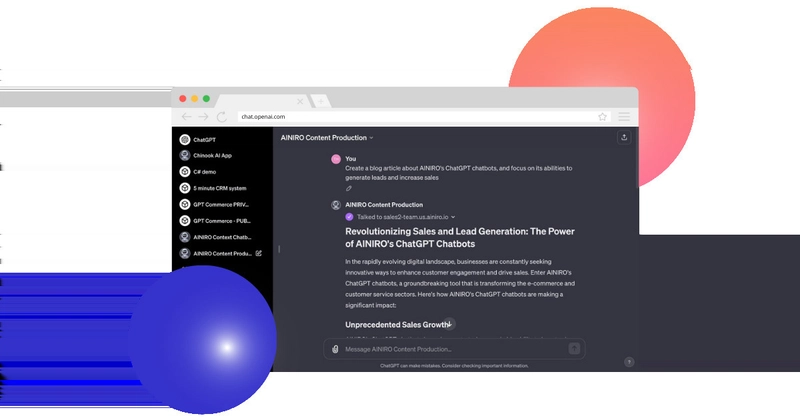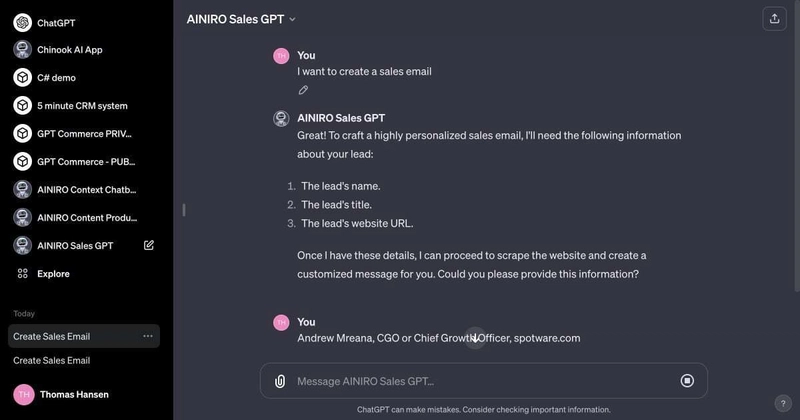Software development is changing in ways we couldn't have imagined just 12 months ago. ChatGPT have changed the profession to the point where it's now possible to create complex software using nothing but English as your primary "programming language".
The last week we have created 3 new GitHub repositories at AINIRO.IO, each being a new plugin for Magic Cloud - And roughly 50% of "the code" for these repositories are in fact plain English. The point being of course that these are custom GPTs created with our GPT Creator.
In addition we've now started using these GPTs internally in literally every single aspect of our operations. Below are some of the things we're using these GPTs for.
1. Content Production
We are now using our "Writer GPT" to produce content. The process is 100% automatic. We give it a query, some instructions, and it will produce search engine optimised articles for us. Once the article is written, it will create a high quality image it will use as its Open Graph image. The image in this article is an example of such an image, and below is how I created our last LinkedIn article.
With a tool such as our Writer GPT, one single agency employee can easily manage 100+ clients, producing all content required to have a well functioning content production department. Previously, each of these 100+ companies would need 5 human employees each to produce the same amount of content. The SEO effects are obvious I presume.
In fact, so far today, I have created 2 blogs, 1 Medium article, 1 HashNode article, 2 LinkedIn articles, and a couple of Facebook posts using this GPT. It's 10:50AM, and my day has barely begun. In fact, I'm not even sure why I'm bothering to manually write this article. I should probably just have asked ChatGPT to generate it for me, outlining the subject and some of my ideas.
2. Sales Emails
We've also create our own Sales GPT, which works like a B2B Sales Executive, allowing us to provide it with a name, optionally a title, and a website URL. Our Sales GPT will then reach out to the website of our lead, and create a highly convincing and personalised B2B sales email, selling our ChatGPT chatbot to the lead.
With our B2B Sales GPT one sales executive can craft 100+ personalised sales emails each day, reducing the probability of that the email ends up in the receiver's spam folder, while using directed arguments that are created explicitly for that particular lead.
The only reason why we haven't started using the above for real, is because we haven't figured out (yet) how to connect MailTrack.io to it since we're using GMail's SMTP servers directly, and not GMail UI.
English as Code
All of these GPTs have one thing in common, which is that most of 'their code' is plain English. The reasons for this is because half the code are instructions, and not computer code. Instructions are specified using English of course, resulting in that half the content of these GPTs' GitHub repositories are in fact English.
All of these GPTs contains a lot of code indirectly. For instance, the Sales GPT will reach out to our backend and retrieve context data relevant to the lead's vertical, to create its selling arguments - Allowing the sales email to be constructed with arguments towards the lead's specific vertical taken from our website.
The amount of energy required to create that endpoint is monumental - However, our platform is now literally so stable with so many features, that when combined with GPTs, it allows for "mere mortals" to literally create complex software systems, with minimum software development experience.
AI is the natural evolution of Low-Code and No-Code constructs
For instance, as I was writing this article, I realised I needed a high quality image, to avoid having it end up as a wall of text - So I opened up ChatGPT and used DALL-E to generate the following image.
Create a 1200x630 pixel image depicting an AI robot using Low-Code and No-Code, combined with a magic wand, to pull software solutions out of a magic hat. Do not add text to the image
If I was to pay an artist to create the above, I suspect it would have costed me somewhere between 200 and 1,000 dollars. ChatGPT and DALL-E created it for me in 30 seconds, and the price was 10 cents.
There's a lot of focus on having ChatGPT generate code. If you reduce ChatGPT to a "code production monkey" I suspect you're missing the point. The point is that English is code.
The purpose of English is to transfer logic from one sentience to another, allowing humans to communicate intent, creating understanding, by passing logic to each other. I really don't see any conceptual differences here in regards to computer code. The only difference is that it's a "slightly different type of sentience" really. However, with LLMs the differences between computer code and natural language have been eliminated, and we can now claim that English in fact is code - Because the computer can understand English, extract logic from it, use it as instructions, and perform some task according to our requirements.
English IS Code!
Sim Sala Bim
By combining ChatGPT and DALL-E with our GPT Creator and Magic Cloud allows a single human being to deliver productivity we'd need 1,000 human beings to be able to deliver 12 months ago. What consequences does this pose to us as a society?
If I asked ChatGPT to finish this article with a punchline increasing its ability to go viral and increase engagement, it would probably finish with something such as "What's your opinion" or some other question, to increase the probability of that somebody actually comments on the article, to increase engagement. So instead of me concluding, I'll ask you to conclude, by answering the following question in a comment where you see me sharing this article.
What's the consequences for us as a society when English is Code ...?
This article was inspired by a Facebook post from Bonnie Factor






Top comments (0)